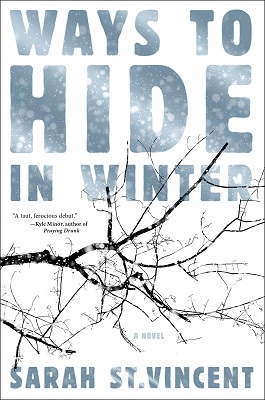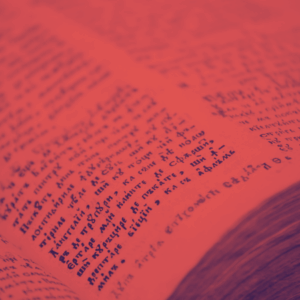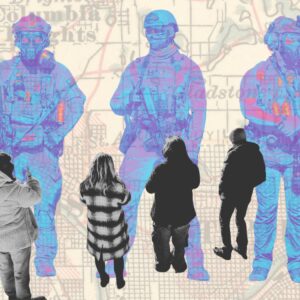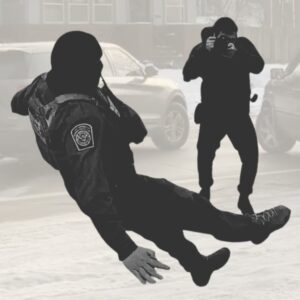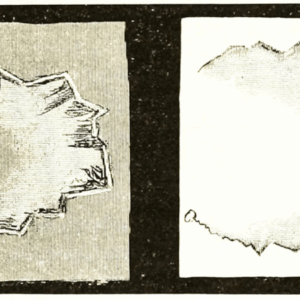The last of the deer hunters had come through for the day, and I was closing the store, counting the cash and watching the snow turn the gravel parking lot into a dappled expanse of white on gray. Someone had abandoned a car there a few weeks back, an ancient brown Subaru that was gradually succumbing to a shroud of whiteness, its tires deflating. A silence wound its way through the pines, slipping on the hidden, frozen creeks, drifting quickly on the wind. The hunters brought it in on their boots, brushed it from their hats, felt the remnants of it on their lips and fingers. When they ordered, the words were soft and gruff, as if this were no place for sound.
There was an old plastic broom on the porch, and I used it to knock the snow off the metal signboard before dragging it inside. Sandwiches, it announced. Ice Cream. Hot Coffee. Illustrated with silhouettes of a steaming mug, a man’s hand giving a thumbs-up. The porch, with its picnic tables balanced carefully on eroding cement, was covered in a layer of dirt, a few spots of ash where the hunters sat if they didn’t feel like leaving the cold. They would hunch there in their thick jackets, faces looking ageless behind their beards as they smoked. Sometimes for minutes, sometimes for hours, they would stay there, gazing at the old iron smelter that stood just down the hill, exposed to the elements, its proud limestone chimney slowly crumbling and falling.
There were still a few trail-hikers in the forest, too, the diehards, mostly retired men with time on their hands, even though it was dangerous to venture into the park at this time of year. The trails were over-grown, their markers obscured by snow, and the hunters—cautious as they were—had been known to mistake many things for deer.
I left the sign swinging in a corner and moved behind the counter. Outside, the snow was growing thicker, and I knew I should go—should have left hours earlier, in fact. I lifted the half-full coffeepot from the burner with my right arm—the good one—and tilted it over the sink, but then paused. On the other side of the window, the clouds seemed to trap the light against the earth, reflecting it from snow to cloud and back again, prolonging the dusk. The wind stirred the tops of the pines, making them ripple against the sky, bending and rising under the great invisible thing that moved them, as if they were underwater.
Watching them, the coffeepot heavy in my hand, I leaned against the edge of the sink. The wind grazed the edges of the building, humming. I chewed my lip.
Then, reaching for a styrofoam cup, I poured in a stream of the black liquid, dumped in a spoonful of sugar, and went out.
“A silence wound its way through the pines, slipping on the hidden, frozen creeks, drifting quickly on the wind. The hunters brought it in on their boots, brushed it from their hats, felt the remnants of it on their lips and fingers.”
The store had once been a stable and was long and narrow, made from blocks of limestone probably hauled in from the quarries that had been just down the road. Standing under the low wooden roof of the porch, I leaned back against the wall, sipping the coffee and looking out over the mountains. Below me, the empty trail unfurled along the edge of a steep drop, past the fallen smelter and vacant campground, on its long, forbidding march from Maine to Georgia. Up the hill, the windows in the two-story brick hostel were all dark, giving the place a grim, haunted look; the manager, I knew, had left that morning to visit his mother in town, and there hadn’t been a guest in weeks. The summer cabins up the road were similarly empty, surrounded by walls of stacked, frozen cordwood. Viewed from above, their roofs, like the store’s and hostel’s, would have looked like lost islands in a river of trees.
A cold tongue of wind touched my face, and I felt the familiar ache in my shoulder. Planting a hand in my pocket, I took another swallow of coffee. A car passed by on the state road just up the slope, sending vibrations through the hard, frozen air.
When it was gone, the park once again wrapped itself in stillness. Even now, in 2007, this was a corner of the world that had been left in peace, tucked away in the forgotten forests of Pennsylvania, high in the northernmost tendrils of the Blue Ridge Mountains. In my great-grandfather’s time, the two quarries up here had crawled with the to-and-fro of laborers; now, they were just a pair of lakes where, if you were to stand on the bottom, you could look up and see the legs of swimmers and the bottoms of aimless canoes. Or at least, that’s what you would see in the summer. At this time of year, you would be trapped under a foot of ice and—more often than not—the only other person for miles around would be me.
Finishing the dregs of the coffee, I crushed the cup and went in, plucking a dirty ashtray from one of the tables as I passed. The door banged shut behind me.
I slipped my library book into my purse and turned in a circle, making sure everything was turned off, the grill and the coffee machine and the deep-fryer that left my skin smelling like hot oil. My eyes swept over the small space, skimming past the blurred reflections of the young woman with the pointed elbows who turned with me.
Of course, everything was turned off. I had never forgotten.
Just as I was reaching into my pocket for the keys, the door hinges groaned behind me. Jumping in surprise, I spun to face the front of the store, realizing even as I did it that I was moving much too quickly, making a mistake. Pain sang through my hip and shot down my arm in a dart, hard and searing, the shock of it running through me like a blade.
Gasping and bending nearly double, I found myself standing with my back against the grill, staring at a wide-eyed stranger.
“Please don’t scream! I’m so sorry. Please don’t scream.”
The stranger was tall and thin, wearing jeans and a padded brown jacket that was much too large for him, black hair protruding from under a dirty knit cap, a scarf wrapped over his nose and mouth. His hands were bare and half-raised, as if in surrender.
“What do you want?” I asked. My hip throbbed, and I gripped it with both hands, pressing down against the muscles that had seized over the bone. The pain sent a cloud across my vision, harsh and blue and electric, and for a moment I thought I would have to kneel on the floor.
The stranger’s eyes were wide and black above the scarf. “I’m very sorry. Are you all right?”
With an effort, I nodded.
“In my great-grandfather’s time, the two quarries up here had crawled with the to-and-fro of laborers; now, they were just a pair of lakes where, if you were to stand on the bottom, you could look up and see the legs of swimmers and the bottoms of aimless canoes.”
“I saw the light on,” he continued, obviously alarmed. “I thought your store was open.”
“It’s not my store. And it’s closed.” Facing him, I caught my breath. “What were you coming in for?”
“Nothing, nothing—please don’t worry about it.” He lowered his palms and glanced around, seeming to take in the shelves of insect repellent and canned sausages, the ice cream case, the telephone that had been dead since the fire. “I was just looking for something hot to drink.”
I gave him a long, doubtful look, keeping a grip on my side as I slowly straightened. “We’re closed,” I said again.
“I’m very sorry. I can see I’ve inconvenienced you.” He stepped backward, reaching behind him and fumbling for the knob. His accent sounded foreign, the words rounded and stumbling, dropping like marbles. “I’ll come in tomorrow.”
“It’s Saturday. We’re not open tomorrow.” I drew a breath. He was extraordinarily slim, a pale slice of a person, with a high voice and raised eyebrows. A musty smell seemed to emerge from his coat when he moved. “Is there something you need?”
“Oh, no, I don’t want to trouble you. In fact, I’m really just looking for the man—the, ah . . . whoever runs this little hotel, up the hill. I thought you might know where he was. Or she.” He tugged the scarf down, revealing thin lips and cheeks that were sunken, famished-looking, maybe feverish. He was young, I thought—or at least, a few years younger than I was. Maybe twenty-five.
“He’s away. He won’t be back until tomorrow.”
The stranger fingered the buttons on his coat, considering this piece of information. “Is there somewhere else to stay?”
“No.” I looked him up and down, beginning to grow curious in spite of myself. “It’s a state park. There’s nothing around here for miles. You’d have to go into town.”
His eyebrows drew together, and he leaned back slightly. “Ah.” A thoughtful pause. “You mean . . .”
“Carlisle. It’s about ten miles north of here.”
“Ten miles,” he echoed. “I see.”
Behind him, through the screen door, I could see the snow, even heavier now. A gust of cold reached me where I stood, still pressing a hand against my side, as if to silence a voice there.
The stranger looked over his shoulder, rubbing his bare fingers together as he took in the same sight. As I watched him, my conscience began to get the better of me; even so, I was surprised to hear myself speak.
“I have a key to the hostel,” I said. “I could probably let you in.”
He turned back to me. “Really? That would be most kind of you.”
“Just until Martin gets back. Then you’ll have to talk to him. I’m not sure if he’ll want to keep the place open for just one person.”
“Pain sang through my hip and shot down my arm in a dart, hard and searing, the shock of it running through me like a blade. Gasping and bending nearly double, I found myself standing with my back against the grill, staring at a wide-eyed stranger.”
The key was on a hook behind the ice cream case, empty at this time of year except for a lone and inexplicable drum of strawberry, which I dipped into from time to time as I sat at the counter and read. Sometimes entire days went by without anyone coming in. The store’s owner, a placid and forgetful man, long since retired to South Carolina, made most of his money during the summer; he kept me on during the colder months largely out of charity, I knew. I reached for the key without taking my eyes off the stranger.
“Is your car in the lot out here?”
He removed his hat and held it in his hands, knitting his long fingers into the fabric. His hair was limp and untrimmed. “No, I—I don’t have a car, actually.”
“You walked?” His shoes were odd, resembling dress shoes but cheap and rubbery, with heavy soles and fragile-looking laces. Not at all suited for hiking, and possibly not even suited for walking.
“No, I was given a ride. It would be a long way to walk, wouldn’t it?”
I realized I was squinting at him, this man with the peculiar face and even more peculiar accent. “It would.”
“My bag is on the porch,” he said, still fingering his hat. “But of course, I can carry it.”
“All right.” I reached for my coat and pulled it on, fastening the buttons. It was long and gray, left over from my time in college, still warm despite the holes in the lining that I’d never bothered to fix. In a few more years it would grow visibly shabby, and then I would consider replacing it, but in the meantime there wouldn’t be anyone to notice. My grandmother, with whom I lived, was increasingly blind.
He did have a suitcase, small and blue and wheeled. We stepped out from under the porch awning and walked side-by-side to the path that led up the hill. Above us, the hostel was still dark, a lonely mass of brick. Once a dormitory for the ironworkers who had journeyed across the sea from Ireland, Scotland, Germany, it was now a bare-bones refuge for the masses who came through on the trail—the Appalachian Trail, the one that put us on the map—in the summer. I unlocked the entrance, handed the stranger a set of sheets and towels, and showed him where to sign his name in the guest book. “You can pay Martin tomorrow. That’s the manager. Pick any room with a cot in it.”
“Thank you,” he said, but I was already stomping outside in my heavy boots, going home.
*
The next morning’s light was thin and gray, the clouds hanging over the sun. It was still snowing. I rolled over in the cold sheets, drawing the afghans around me. The pills sometimes made me forget where I was upon waking, giving me a long moment of confusion as I examined the stains on the ceiling. The feeling never lasted for long, though. Everything came back eventually, even if it didn’t always come back all at once.
I did my best to stay wrapped in the blankets as I sat up and leaned against the wall, letting the world come into focus from my place on the mattress on the floor. Through the window, I could see the field with its mossy brown Herefords, the bleak gash of Route 233, the family plot with its row of gently leaning headstones. It was Sunday, and somewhere across the fields a bell sounded. A horse and cart appeared on the road and passed with the rhythmic, fading sound of hooves. Probably a Mennonite family heading to the church a few miles west in Walnut Bottom, I thought, gripping a blanket under my chin. Sometimes I wondered if they really felt as religious as they looked, the Mennonites, with their men in somber black hats and their women in those plain dresses and stiff-looking hairnets. Maybe they just got into the habit of doing things the way they did them, and that was why they bothered to rig up a horse and buggy every Sunday, even in the winter.
Aside from them, not a soul seemed to be stirring; even the cows were lounging on their sides, watching over their shoulders as the buggy receded out of sight. The railroad tracks that passed by the house were silent, stretching emptily to the east and west.
After a little while, there was a shuffling sound downstairs, a cough, a stream of water pouring from a tap. I could picture my grandmother standing in front of the kitchen sink in her robe, clutching a glass of water, returning to bed. Sure enough, the shuffling soon retreated in the direction from which it had come. Outside, a dog barked several times, as if it had spotted a stranger, and then stopped.
The stranger. Rubbing my eyes, I pushed myself to my feet and walked down the hall to the bathroom, turning the knob in the shower. If he was still on the mountain, I realized as the water struck my skin, then he was alone there, probably with no food. Martin’s closet-sized kitchen rarely contained more than bread and milk, and the hunters would be crouched in silent, camouflaged lumps in the woods by now. Martin himself would be dealing rummy hands at the United Methodist nursing home in Carlisle until the evening.
I could have called him, told him he had a guest.
Instead I got into the Jeep and set off toward the winding roads that led upward.
Who was this stranger? Russian? Greek? I had never met a Russian, or any Greeks aside from the dark-haired, weary-looking family who ran the diner in Carlisle, but couldn’t think of any other guesses. A married man, it seemed—I had glimpsed a gold band the previous day—but alone. Alone in rural Pennsylvania, in the woods. A state park built around some flooded quarries and an abandoned iron smelter. An empty hostel next to a store that sold little more than firewood and beans. A place that was miles away from anywhere, where even the telephone and electricity lines were unreliable thanks to the fire that had swept over the mountain a few months earlier. I couldn’t understand it.
There was just no reason for a person to be there in December unless he was searching for a quiet place to shoot deer.
The radio signal faded as I made the steep climb, passing through the stands of live pines and, every few hundred yards, the stands of burned ones. Birches and maples. A few red oaks. The maples, when I noticed them, always made me think of the two trees in the yard behind my grandmother’s house—the ones my father had planted when my brother and I had been born. It was my brother who had taught me to keep cars like this one running, or rather, had let me watch while he taught his friends; the rest I’d eventually figured out myself. I listened to the murmur of the engine as I steered around a bend, the whispering sound as snow and ice gave way under the tires.
The stranger was sitting on the porch in front of the store when I pulled into the lot, slamming the car door and approaching noisily in my boots. Same knit cap on his head, same tan scarf pulled over his nose and mouth. Looking out, it seemed, over the long, undulating slopes of the mountains draped in fog. He gave a jerk when the car first appeared, rising to his feet with a wary look, as if he might run. When he recognized me, however, he sat back down and even gave a small wave.
“Hey,” I said neutrally, wiping my shoes on the cement and digging the key out of my pocket as I passed him.
“Hello!” His eyes were no longer feverish, but inquisitive, even merry. “Is something the matter? I thought your store was closed today.”
“Who was this stranger? Russian? Greek? I had never met a Russian, or any Greeks aside from the dark-haired, weary-looking family who ran the diner in Carlisle, but couldn’t think of any other guesses.”
“It’s still not my store.” The deadbolt turned back with a satisfying thump. “And it is closed, but I thought you might be hungry.” I pushed my way in, dropping my coat and book on the floor. The lights came on with a flickering buzz. “What do you want?”
He followed me in, startled, looking like a courteous but starved wolf. “Oh, no. I don’t need anything.”
I crossed to the other side of the counter and folded my arms over my chest, trying to clear the last of the haze from my mind as I surveyed the terrain. “Egg sandwich? That’s probably the best I can do.”
He stood by the door, hesitant. “Well. If you really don’t mind. All right.”
“If I minded, I wouldn’t offer,” I told him bluntly, turning the knob on the grill. “Coffee? Tea?”
“Yes, tea would be delightful.” The hat had come off; he was staring, forming his replies slowly. “Thank you.”
“Sugar’s over there by the door. I’ll have to open some milk.” I flipped the switch on the coffee maker, which doubled as the hot water machine, and pulled two styrofoam cups from the pile. The grill began to heat, and I scraped it carefully, even though it didn’t need to be scraped. I could sense him behind me, watching, and suddenly became aware that my movements were a kind of methodical flurry, a hurried but well-practiced sequence of pushings and polishings and liftings and turnings, as if I had been programmed to do these things. Vaguely embarrassed, I slowed down.
“You’re from Russia?” I asked, doing my best to sound indifferent.
“What? Oh—no.” He cleared his throat. “That is to say, not really.”
“Not really?”
“My family is Russian. But I’m from Uzbekistan.” He paused. “It’s in central Asia.”
“I know where it is.” The eggs cracked neatly. “Or at least, I have some idea.”
“Really?”
I turned to look at him, raising an eyebrow. “Yes, really.” There was, in fact, a map on the wall in my room at my grandmother’s place, one I had tacked up years earlier so I could follow my brother’s deployments. Over time, I’d found that I’d gradually begun to absorb its web of rivers, oceans, borders, all those remote places reduced to blots of blue and gray. “You can sit down, you know. There’s a stool over there somewhere.”
The egg whites crackled and hissed in the oil. I smeared slabs of butter onto English muffins with the spatula, dropping the upturned halves onto paper plates. Unwrapped the cheese, poured the tea, slid the eggs onto the muffins and moved everything over to the counter. “Here.”
“Oh, I don’t need that much.”
“One’s for me.”
He drew the stool closer, pinching the hot sandwich between his fingertips and spreading a napkin on his lap, waiting for me to take a bite before he began. As we ate, our heads tilting toward one another, I tried not to stare at him—this stranger who was, indeed, so very strange.
“And you?” He swallowed a mouthful of the acidic tea, dabbing at his mouth politely. “Where are you from?”
I shifted, pressing the soles of my feet against the edge of a shelf beneath the register. “I’m from here.”
“Here?”
I gestured behind me. “Down the mountain. Centerville. It’s a small town—just a couple of houses, really. Well, and a fire station and a store and a library. That’s about it.”
The tea warmed my stomach. Through the steam, I could see him, the delicate-looking line of his scalp as he bent over his sandwich. The same slightly musty smell I had noticed the day before seemed to rise from his coat, and I found myself wondering if he’d slept in it. Then a troubling thought made me examine him more closely. “Was the heat on overnight?”
“You mean at the hotel?” He dabbed at his mouth again. “A little, maybe. Not really. But I had the blankets, of course.”
“I’m sorry.” I closed my eyes, frowning as I lifted the tea to my lips again. “I’ll fix that.”
“It’s all right. I may be leaving before tonight, anyway.” He was looking at me curiously. I was wearing a bulky hooded sweatshirt and men’s jeans, my hair pulled back in a knot that was already coming undone and mouth probably set in that severe, distant line I had recently begun to observe when passing mirrors and shop windows. Where had it come from, that sad, wooden expression? I wasn’t unhappy.
He wiped his fingers painstakingly on a paper towel. “May I ask what your name is?”
“My name? I’m Kathleen.”
“Kathleen—that’s a nice name. I’m Daniil.” He extended his hand carefully and correctly over the paper plates, and we shook. “Thank you for the breakfast.”
“It’s no problem. I’ll give you some soup you can heat up for dinner if you’re still here. That’s pretty much all we’ve got right now.”
“Thank you.” He nodded. “That would be nice.”
“And then I have to go. After I turn on the heat.”
“Yes, of course. Thank you.”
After some searching, I managed to locate some cans of beef stew, which were so dusty I checked each one to make sure it hadn’t expired. He handed me a pair of creased bills that looked as though they had passed through many hands and counted out another dollar in dimes and nickels. Then, almost timidly, he stood with the bag dangling at his side.
“Does it hurt?” he asked, touching his waist.
“What?”
“Your—your side. Yesterday it looked like it hurt you.”
I stopped, standing behind the register, his money in my hand.
“No,” I said after a pause. “It doesn’t hurt.”
“Oh. That’s good. This morning you seemed to be . . .” He hesitated.
“Well, walking a bit unevenly, I suppose. When you got out of the car.”
Heat rose to my face; I could feel it. I pressed my lips together.
“No,” I said again, quietly but firmly. “I’m fine.”
“Yes, of course,” he said hastily, nodding in embarrassment. “I’m sorry. At any rate, thank you once more. It was very kind of you.” When I looked back at him without answering, he cleared his throat. “Well, have a good day, as they say.”
__________________________________
From Ways to Hide in Winter. Used with permission of Melville House Publishing. Copyright © 2018 by Sarah St. Vincent.









